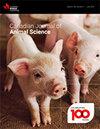Effect of dietary nitrogen content and ammonium phosphate inclusion on lysine requirement for nitrogen retention in growing pigs
IF 1
4区 农林科学
Q3 AGRICULTURE, DAIRY & ANIMAL SCIENCE
引用次数: 0
Abstract
Inclusion of a source of non-protein nitrogen (NPN) may improve essential amino acid (EAA) and nitrogen (N) utilization in N-limiting diets. Growing barrows (20.4 ± 0.5 kg) were randomly assigned to 1 of 10 dietary treatments (n=9 pigs/treatment) in 9 blocks. Diets contained no ammonium phosphate (NAP) or 1.7% ammonium phosphate (AP) to have an EAA-N:total N ratio of 0.36 and 0.33, respectively, with graded levels of dietary Lys [0.8%, 0.9%, 1.0%, 1.1% and 1.2% standardized ileal digestible (SID)]. Following a 7-d dietary adaptation, a 4-d N-balance collection period was conducted. Blood samples were obtained on d 2 of the collection period. Nitrogen-retention increased and urinary N output decreased with inclusion of NPN and increasing Lys (P < 0.01). Plasma urea N decreased with increasing Lys (P < 0.05). Total plasma EAA content was reduced with NPN supplementation (P < 0.05), while content of Arg, Asp, Gln and Glu were increased (P < 0.01). The linear breakpoint model indicated NR was maximized at 1.00% SID Lys in NAP-fed pigs and at 1.09% SID Lys in AP-fed pigs. These results indicate that diets deficient in dietary N reduce NR and Lys requirement, which were in turn increased with NPN supplementation.日粮氮含量和磷铵添加量对生长猪赖氨酸保氮需求量的影响
在限氮日粮中添加非蛋白氮(NPN)可提高必需氨基酸(EAA)和氮(N)的利用率。在 9 个区块中,将生长中的小猪(20.4 ± 0.5 千克)随机分配到 10 个日粮处理中的 1 个处理(n=9 头猪/处理)。日粮不含磷铵(NAP)或含磷铵(AP)1.7%,EAA-N:总氮比分别为 0.36 和 0.33,日粮中的赖氨酸水平分级为 [0.8%、0.9%、1.0%、1.1% 和 1.2% 标准回肠可消化(SID)]。经过 7 天的饮食适应后,进行了 4 天的氮平衡采集。在采集期的第 2 天采集血液样本。随着 NPN 的加入和 Lys 的增加(P < 0.01),氮保留增加,尿氮排出减少。血浆尿素氮随着 Lys 的增加而减少(P < 0.05)。补充 NPN 后,血浆总 EAA 含量降低(P < 0.05),而 Arg、Asp、Gln 和 Glu 含量增加(P < 0.01)。线性断点模型表明,NAP 饲喂的猪在 SID Lys 为 1.00% 时 NR 最大,而 AP 饲喂的猪在 SID Lys 为 1.09% 时 NR 最大。这些结果表明,日粮中缺乏 N 会降低 NR 和 Lys 的需要量,而补充 NPN 又会增加 NR 和 Lys 的需要量。
本文章由计算机程序翻译,如有差异,请以英文原文为准。
求助全文
约1分钟内获得全文
求助全文
来源期刊

Canadian Journal of Animal Science
农林科学-奶制品与动物科学
CiteScore
2.30
自引率
0.00%
发文量
51
审稿时长
6 months
期刊介绍:
Published since 1957, this quarterly journal contains new research on all aspects of animal agriculture and animal products, including breeding and genetics; cellular and molecular biology; growth and development; meat science; modelling animal systems; physiology and endocrinology; ruminant nutrition; non-ruminant nutrition; and welfare, behaviour, and management. It also publishes reviews, letters to the editor, abstracts of technical papers presented at the annual meeting of the Canadian Society of Animal Science, and occasionally conference proceedings.
 求助内容:
求助内容: 应助结果提醒方式:
应助结果提醒方式:


